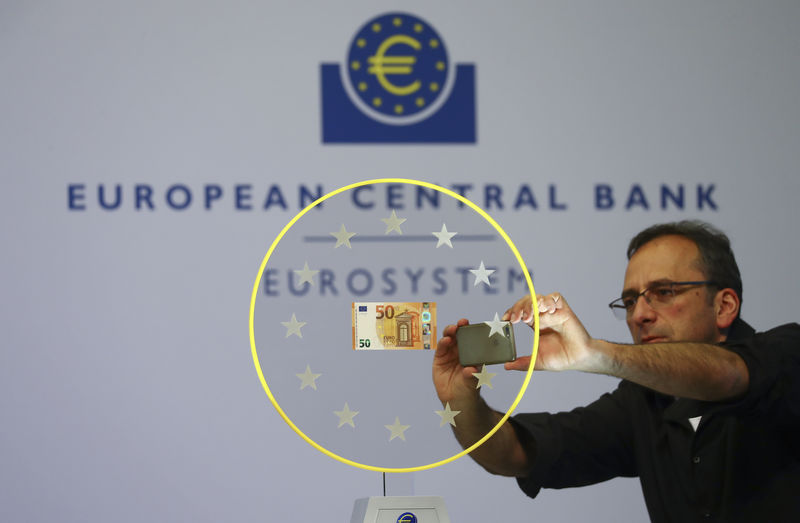(Bloomberg) -- Bond investors are preparing for another wave of quantitative easing from the European Central Bank by returning to some of their favorite post-crisis trades.
First up: buy the debt of nations such as France that have greater scope for purchases by the ECB. Next, bet on a drop in longer-maturity yields relative to near-term rates. Then go for the region’s higher-returning bonds, like Spain.
While fund managers are not expecting any immediate move by the ECB, many are factoring in action to stimulate the region’s flagging economy this year. The global trade conflict and record-low inflation expectations have turned money markets to price in rate cuts by 2020. Since the ECB has kept deposit rates negative, policy makers might be more inclined to re-visit QE first.
“I would expect further rate cuts, QE, a further extension of forward guidance,” said Russell Silberston, a fund manager at Investec Asset Management, which oversees $133.7 billion. “At the broadest level we like anything that benefits from lower for longer, so yield curve flatteners for example.”
ECB President Mario Draghi said at the bank’s last policy meeting that there is “considerable headroom on QE.” Other officials have since reinforced the message. Bank of Finland Governor Olli Rehn, a candidate to replace Draghi this year, tweeted the ECB has “gotta do what’s gotta do, as needed.”
In the last round of QE following the financial crisis, the ECB hoovered up 2.6 trillion euros of debt from 2015 to the time they called it quits at the end of 2018. That insulated markets from risk and led to winning bets for funds buying German, French and Italian debt, which were among the biggest beneficiaries of the program and saw yields fall to historic lows.
The debt of nations with more longer-term securities that the ECB could still buy -- such as France -- are now outperforming in the latest rally. That’s because, with the ECB only taking bonds yielding more than its minus 0.4% deposit rate, those have become scarcer. It is also pushing long-dated yields down faster.
Flattening Curves
The flattening of yield curves “has much further to run” as the restart of QE was barely factored into markets before the ECB’s last meeting, according to Citigroup’s Jamie Searle in a note entitled “Flatteners, flatteners, flatteners”. He favors trades targeting a fall in Spain’s 30-year yields relative to 10-year bonds.
Investors have been piling into bonds since then, driving yields across the continent to fresh record lows and narrowing premiums over Germany. Danske Bank A/S likes bets on these spreads tightening further as it sees the pressure mounting on the ECB, while Rabobank’s head of rates strategy Richard McGuire recommends traders buy 30-year Belgian bonds versus Germany.
Others favor Italy, which has plenty of debt for the ECB to soak up. While Italian bonds have been weighed down by political risk in the past year, they “would be the clearest long in Europe” if QE were to restart, according to NatWest Market’s Giles Gale. He recommends five-year Italian debt against Germany.
Scarcity Trades
A restart of QE is far from set in stone as the ECB may need to see more signs of an economic slowdown in the second half of the year to act. Any easing of trade tensions could scupper trades placed too soon, while a revival of inflation expectations could also curb the market speculation.
“The macro picture is not bad enough yet to prompt more easing, but there has clearly been a shift in focus towards downside risks to growth and Draghi is prepping the market for more stimulus if things do get worse,” said Joubeen Hurren, a money manager at Aviva (LON:AV) Investors. “Curves can still flatten.”
Restarting bond buying wouldn’t be without its hurdles either. The ECB is currently only allowed to buy 33% of the total stock of a given nation’s bond and it is already at that level in Germany, and close in the Netherlands, according to Citigroup Inc (NYSE:C). By comparison, the bank estimates it has France and Italy at around 20%.
This issue of scarcity is leading some investors to buy bunds versus interest-rate swaps, which the ECB would be unlikely to buy. This trade could also serve as a hedge against turmoil, such as a flare up in Italian political risk, with the bonds outperforming from a flight to safety. Bank of America (NYSE:BAC) Merrill Lynch’s Sphia Salim favors buying 30-year German bonds against interest-rate swaps.
“We like owning shorter-dated bonds in Germany and also in European swaps,” said Grant Peterkin, a senior managing director at Manulife’s Absolute Return Rates Fund. “We still feel there is value in a world where inflation expectations continue to be muted and some form of stimulus will be needed to reflate the global economy.”
